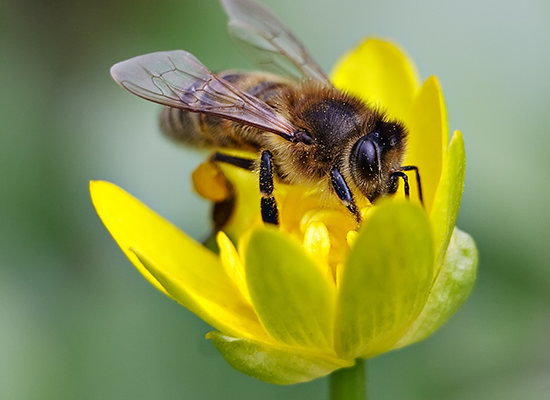
Vestaron’s Peptide Insecticides: Bad for Bugs, Safe for Bees

The stakes have gotten higher in the $50-billion-plus global crop protection industry. Growers and consumers want insecticides that only harm the bad bugs – not the beneficials, like bees, nor the workers, the environment or the food supply.
Vestaron, a start-up that recently moved its corporate headquarters to Research Triangle Park from Kalamazoo, Mich., believes it has the answer to these and other industry challenges. Rather than developing another synthetic insecticide – a lengthy, risky and expensive process – it is moving to commercialize the use of peptide-based bioinsecticides.
Two products on the market so far
It has two such formulations approved by the U.S. Environmental Protection Agency:
- Spear-T, approved in 2018, is a concentrated liquid for use against a broad range of insect and mite pests in the greenhouse.
- Spear-Lep, approved this year, targets lepidopteran (caterpillar) pests in outdoor and indoor crops.
Investors agree Vestaron is on to something. The company secured $40 million in Series B venture capital this summer. Novo A/S, a Danish holding company of pharmaceutical giant Novo Nordisk A/S, led the investment deal. It also included Boston-based Anterra Capital; Syngenta Ventures, the corporate venture capital arm of Swiss agricultural chemicals company Syngenta AG; New York City-based ag-focused private equity firm Continental Grain Co.; Chicago-based Cultivian Sandbox Ventures; Effingham, Ill.-based Open Prairie Ventures; and Vancouver, British Columbia-based Pangaea Ventures Ltd.
Formerly an R&D-only firm, the 14-year-old spinout from Western Michigan University will use the funding to expand current offerings internationally, expand R&D, and build out product development and customer support. The R&D center will remain in Kalamazoo.
Along with the move of corporate headquarters to 600 Park Offices Drive (The Frontier), Vestaron recently added industry veteran Scott Jackson, Ph.D., to the RTP-based executive team as vice president of regulatory and government affairs. Jackson has more than 20 years of agricultural chemical experience, in regulatory affairs for Knoell USA, and in stewardship and sustainability at Valent USA and BASF Corporation.
Addressing industry challenges

Traditional small-molecule synthetic insecticides are very effective, but they are starting to have more environmental and safety issues and problems with pests developing resistance to them. In a major step, the EPA canceled registration, on May 20, 2019, of 12 neonicotinoid-based products used as pesticides in agriculture. The move arose out of concern for bees, which are beneficial insects vital to pollination.
Neonicotinoids are a class of insecticides chemically related to nicotine that are much more toxic to invertebrates, such as insects, than to mammals, birds and higher organisms. They target the nicotinic acetylcholine receptor (NOA) of the insect’s nervous system. This makes them highly effective, yet new research has shown potential for toxicity to bees, according to Texas A&M University.
In addition, small-molecule synthetic insecticides require many years of development and cost millions to commercialize. They also take longer to get approved because the EPA requires more data in the review of synthetic chemicals than in biologics.
Biologic microbes used in crop protection, on the other hand, are safe and environmentally friendly, as confirmed by academic researchers, but don’t always have the same efficacy as traditional small molecules, according to Anna Rath, JD, president and CEO of Vestaron.
“What is unique about Vestaron is that our peptides are proven to have the same level of efficacy as traditional small-molecule agricultural chemicals but with the safety and environmental profile of microbials,” said Rath. As she explained, the company’s peptide products target the same NOA receptor as the synthetics yet are safe to honeybees.
Why use peptides?

Peptides are organic substances made from amino acids with molecules structurally like proteins, only smaller. Vestaron’s researchers work with a range of naturally occurring peptides already confirmed to have potent insecticidal properties, such as venom peptides taken from spiders. Next, they modify the natural molecular structure and confirm a lack of activity against mammals or vertebrates in general. Then they synthesize the genes that encode for the peptide and put them into a yeast strain as part of a proprietary fermentation production system.
The result is the active ingredient for formulation into a bioinsecticide that targets the NOA receptor in target insects. The NOA receptor is one of the two most important receptors for killing an insect, explained Rath.
Vestaron’s active ingredient is useful for protecting fruits, vegetables, ornamentals and other high-value crops. Another method is to take those same genes and put them directly into plants to create plant-incorporated pesticide, which are a well-established and efficient way to deliver insecticides to target pests.
The key difference in Vestaron’s products, according to Rath, is in how they optimize the peptides and make them bioavailable to the target insects. Their research found a way to get the optimized peptides to move across the wall of the gut inside the target insect to reach the NOA receptor. They do this by pairing the peptides with a protein derived from a bacterium, Bacillus thuringiensis, or Bt, that, while less effective on its own as a bioinsecticide against the target insect due to lack of field stability, causes scarring of the lining of the target insect’s gut. This enables the optimized peptides to move through and reach the NOA receptor. And, while this process is lethal to the target insects (the bad bugs), it is not harmful to bees (beneficial insects).
Interestingly, Rath explained, until recently, the EPA had only two regulatory pathways for approving insecticides – synthetic and microbial. However, EPA has created an emerging technology division for approving this third category of isolated biologic molecules, such as peptides.
About Vestaron
In late 2017, Vestaron’s board of directors made a strategic decision to move toward capitalizing and commercializing its own products. That led to their hiring Rath in early 2018 as president and CEO and charging her with hiring an executive team.
Rath holds a master’s degree in genetics from the University of Michigan and a JD from Yale Law School, is a board member for the Biotechnology Innovation Organization and the 2016 recipient of the Rosalind Franklin award for female leadership in industrial biotechnology. She is a veteran of the ag tech industry, founder and former CEO of NexSteppe and previously led commercial and business development at the agricultural biotechnology company Ceres.
Other hires by Rath include several industry veterans with North Carolina connections:
- Ben Cicora, senior vice president of sales & marketing, a veteran of Dow, Bayer, Agrium and NutiAg, with an MBA from UNC.
- Jessica Vannoy, chief financial officer, recently at Durham-based Dova Pharmaceuticals, with a BS/BA in accounting from Appalachian State University and an MBA from Campbell University.
- Ash Patel, chief operating officer, also from Dova Pharmaceuticals.
The company has made additional hires locally, including graduate student interns from the North Carolina State University Microbial Biotechnology program. It is seeking a product development manager.
Vestaron chose RTP for its corporate headquarters because of the vitality of its agricultural sector and available talent pool as the company makes the transformation from a small R&D spinout to a commercially competitive innovator in the burgeoning bioinsecticide industry, said Rath.
